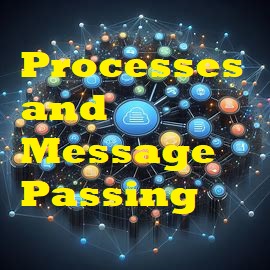Processes and message passing are concepts in operating systems and parallel computing that enable communication and coordination between independent processes or threads.
Processes:
A process is a self-contained unit of execution that has its own memory, CPU registers, and system resources. Processes are isolated from each other, and changes made by one process do not affect other processes.
Message Passing:
Message passing is a mechanism that allows processes to communicate with each other by sending and receiving messages. Messages can contain data, requests, or notifications, and are typically sent through a communication channel or queue.
Types of Message Passing:
1. Synchronous Message Passing: The sender process waits for a response from the receiver process before continuing execution.
2. Asynchronous Message Passing: The sender process does not wait for a response and continues execution immediately.
3. Remote Procedure Call (RPC): A type of message passing where a process sends a request to another process to execute a procedure and return the result.
Message Passing Models:
1. Client-Server Model: One process acts as a server, providing services to multiple client processes.
2. Peer-to-Peer Model: Processes communicate with each other as equals, without a central server.
3. Producer-Consumer Model: One process produces data, and another process consumes it.
Message Passing in Parallel Computing:
Message passing is essential in parallel computing, where multiple processes or threads work together to solve a problem. It enables:
1. Data Sharing: Processes can share data and results.
2. Coordination: Processes can synchronize and coordinate their actions.
3. Load Balancing: Processes can distribute work and balance the load.
Examples of Message Passing:
1. Socket Programming: Processes communicate using sockets, sending and receiving messages over a network.
2. MPI (Message Passing Interface): A standard library for message passing in parallel computing.
3. IPC (Inter-Process Communication): Mechanisms for message passing between processes on the same machine.
In summary, processes and message passing enable independent units of execution to communicate and coordinate, facilitating parallel computing, distributed systems, and efficient resource utilization.




0 Comments